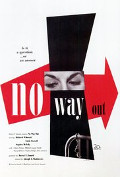
Directed by
Joseph L. Mankiewicz
106 minutes
Rated PG
Reviewed by
Bernard Hemingway

No Way Out
Although Joseph L. Mankiewicz's anti-racist film was no doubt a bold statement in its day and deserves recognition as a an early example within Hollywood to bring black-white relations to the big screen it now comes across as strident in its moral didacticism.Sidney Poitier in his first credited feature film role, plays Dr. Luther Brook, a nre resident doctor in a county hospital under the supervision of Dr. Wharton (Stephen McNally). Brooks is conscious of the difference his skin colour makes to how his performance is assessed but when two brothers, Ray (Richard Widmark) and Johnny (Dick Paxton), who were shot robbing a gas station are brought In he Is unprepared for what happens next. Johnny dies while Brooks is examining him and Ray, a vitriolic racist, accuses him of having killed his brother and uses the incident to incite a race riot.
It is obvious from the get-go with Poitier playing the super-nice novice doctor, McNally \as his super-considerate boss and Widmark the pathologically hateful racist where the film is headed and there are no surprises in this respect. Heck. Brooks even lives cosily at home with his elderly mother (Maude Simmons, his solicitous wife (Mildred Joanne Smith), brother John (Ossie Davis) and the latter's wife, Connie (Ruby Dee).
Rather superficially, Joseph L. Mankiewicz and Lesser Samuels’s script make this presence of motherly love (Wharton lives alone but has black housekeeper (Amanda Randolph) who, of course mothers him) the psychological lynch-pin on which the story turns, it gradually emerging that Ray was sorely-deprived of maternal love and resents “niggers” because to him they had/have what he did/has not. Precisely because the script reduces racism to such a personal pathology and makes it so flagrant in expression it undermines the effectiveness of the film as a socially-critical statement. It does however redeem itself somewhat by showing the reality of poverty and ignorance as the breeding ground of race hate (given this is it unclear what the film’s title is supposed to mean).
In this respect Linda Darnell’s Edie, Johnny’s former wife, who has pulled herself out of the slums and who has an ambiguous relationship with Ray is the most engaging character her performance having a depth that is not available to the rest of the cast who presumably were unable to do much more than follow Mankiewicz’s direction.FYI: Poitier would go on to make many more “social conscie nce' films including The Defiant Ones (1958). No Way Out was the first film that featured both Ossie Davis and his wife Ruby Dee including Spike Lee's Do The Right Thing (1989) and Jungle Fever (1991).
Show detailed review
Want something different?





